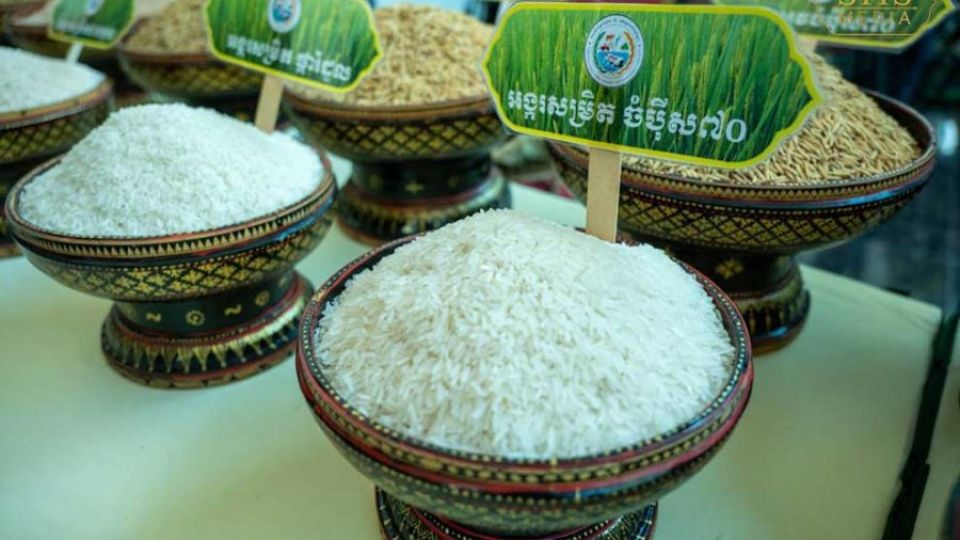February 2, 2024
PHNOM PENH – Prime Minister Hun Manet stated that favourable conditions for both wet and dry-season rice production in the past year, coupled with rising prices, have prompted farmers to increase dry-season rice cultivation beyond the planned capacity, leading to the risk of water shortages for farmers.
The prime minister made the remarks while presiding over the closing ceremony of the Ministry of Agriculture, Forestry and Fisheries’ annual results review meeting for 2023 and the implementation plan for 2024, held at the ministry on January 30.
“This is a task that needs to be monitored regularly, especially this year as the world assesses the risks of the long-term severe weather phenomenon El Nino. Last year, we had a lot of favourable conditions to produce both wet and dry-season rice, with prices being very high.
“However, due to the high price of paddy rice, farmers have increased their cultivation of dry-season rice beyond the plan. Of course, this is commendable, but we must not focus solely on the immediate future,” Manet warned.
“In the past, some people have questioned why some provinces have issued instructions not to allow people to cultivate a second round of dry-season rice. The water in our reservoirs is used for growing rice and for the consumption of the people, so our priority is to think about practical plans. The intervention of many provincial administrations has been timely,” he added.
Manet expressed gratitude for the storage of water during the rainy season for future use but also noted that water levels are somewhat declining.
He said it was possible to solve the problem in some places, but in others, provincial authorities have had to install water pumps for the people.
“I would like to thank our provincial and district authorities for their timely intervention. However, maintaining water for strategic long-term use, especially in years when we can predict water scarcity, requires us to plan and implement step-by-step solutions to future problems and reserve water for long-term use. I urge all citizens, especially our farmers, to join hands in this endeavour,” he said.
The prime minister added that agriculture is an important priority sector that contributes to ensuring food security, promoting rural economic development, improving people’s living standards, reducing poverty and supporting national economic growth.
Increased cultivation, opportunity for growth
Ministry of Water Resources and Meteorology spokesperson Chan Yutha stated that as of January 29, the cultivation of dry-season rice across the country exceeded 740,000ha, while the ministry had set a plan for around 500,000ha.
He said that with some areas still growing, this leads to difficulties in water shortage management.
“Cambodia has never seen such extensive cultivation, with a maximum of 660,000ha of dry-season rice planted in the past. Now, it has increased to 750,000ha and cultivation continues. Eventually, cultivation will likely increase to 800,000ha.
“In fact, Takeo province planned to plant more than 80,000ha, but the current planting has risen to over 100,000ha. The team has helped to resolve many issues, and the impact is small, only about one hundred hectares,” he said.
Yutha noted that some provinces might face serious impacts, such as Pursat and Battambang, because these provinces have exceeded the plan twofold or more.
He said the variation in challenges from one province to another is due to the combination of El Nino and the fact that drought and heat are expected to increase in April and May, with temperatures ranging between 39 and 14 degrees Celsius.
“As a measure, we continue to intervene gradually. Some areas have to pump water to irrigate the paddy rice twice, and in some areas, up to four times to save the affected [crops]. At the same time, some communes in Pursat province already lack water for daily use. Only then did the department team prepare a means of transporting water to the people,” he added.
Lim Heng, vice-president of the Cambodia Chamber of Commerce, noted that according to the report from the provincial chamber of commerce, due to rising prices, farmers are increasing their production, which makes the area of farmland larger than the available water supply.
However, he believes there might be a positive side to the problem.
“It is also a good opportunity for the government to pay more attention to the case. If the production of dry-season rice increases in such quantities beyond the plan, how should water be prepared? This will enhance the ability of government leaders to study more irrigation to supply water during the dry season,” he said.
At the meeting’s conclusion, the prime minister recommended several strategies, including the enhancement of current markets, the expansion of new markets through free trade agreements (FTAs) and the focused promotion of one or two products.
He said the approach should be underpinned by precise market research, emphasising that it is preferable to over-advertise than to under-represent these products.
Manet stated it is essential to establish consensus on inter-institutional cooperation prior to its implementation; particularly, the agriculture ministry should persist in collaborating with other ministries and institutions to advance the sector.
He said this includes sustaining financial support to ensure sustainable and inclusive growth and continuing the conservation of fisheries resources, encompassing flooded and mangrove forests, along with the preservation of various fish species and Mekong River dolphins.
The prime minister added there should be encouragement for the private sector to invest in aquaculture processing and efforts to reduce imports.


